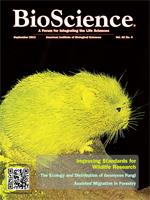Michael Ruse is a philosopher of science who has spent his career exploring the implications of Darwinian evolution on the many ways in which we relate to each other and on our understanding of the natural world. In his well-written new book, The Philosophy of Human Evolution, he continues this exploration. The book is also a clear demonstration that the field of philosophy itself has undergone evolutionary changes.
Scientists tend to dismiss philosophy as irrelevant, and we have plenty of reasons to do so. In my own strictly amateur explorations of the history of science, I have always been bemused by how, for two millennia, the ideas of Aristotle were presented as irrefutable fact by generations of protectors of the status quo. What power his notions had! Consider how, in its infancy, science was smothered by the unquestioning acceptance of spontaneous generation, the Great Chain of Being, the structure of the universe as a series of crystal spheres, and the set of utterly anti-Newtonian laws of motion that Aristotle proposed. The result was a stifling of thought and probably a centuries-long delay in the flowering of the scientific method.
Aristotle, of course, was dust during most of this time. I expect that he would have been deeply embarrassed by how the ideas that he had proposed during the fourth century BCE were latched onto by religious and social reactionaries.
Aristotle lived in a world in which there were only the faintest glimmerings of science and the scientific method. The philosophers of today have learned their lesson. They coexist with a scientific enterprise that permeates every aspect of their lives, just as it permeates the lives of the rest of us. If philosophers of science are going to discuss the philosophical implications of science, they must know what they are talking about.
Ruse's book follows this requirement. He begins with a discussion of the mechanisms of evolution, using some examples from human evolution (and from the evolution of other organisms as well). He then turns to the nature of scientific enquiry, in the process revisiting the old question that Karl Popper (1976) raised (and later modified) about the perils of using natural selection to explain everything. Of course, as Ruse points out, no evolutionary biologist thinks that natural selection is the entire story. But what I missed in his discussion was any survey of the powerful new evidence for a central role of natural selection in Darwinian evolution. As this evidence has accumulated, especially over the last 20 years, it has provided many examples of direct connections between changes in the DNA and changes in adaptive characters. How have these new discoveries changed the way we should look at the science of evolutionary biology? Such a forthright exploration is needed in the battles between science and the current generation of reactionaries.
The central part of the book includes a series of chapters about the ways in which Darwinian evolution has affected our ideas of progress, morality, and the nature of knowledge itself, wherein Ruse focuses on how these aspects of our culture are influenced by evolutionary discoveries. Among other topics, he examines the role of evolution in the rise of altruistic behaviors and in how those behaviors are currently maintained. He does not, however, delve deeply into the current controversy over the role of group selection in the evolution of altruism. As a stout believer in the primacy of individual selection, I would have found it most useful to have his thoughts about whether there are any aspects of altruism that can best be explained by selection acting on groups.
Ruse uses many pages of his book in explaining how evolution may have shaped the range of sexual identities that our species exhibits. He also addresses possible adaptive roles of sexual behaviors that do not lead to reproduction. In view of the rapid evolution of our current thinking on these matters, it would again have been useful if he had explored how cultural factors in the past and in the present might have contributed to the current range of sexual behaviors. Indeed, I missed any in-depth discussion of how cultural factors have influenced our evolution. He dismisses Dawkins's memes (Dawkins 1976) and concentrates primarily on the possibility that “bad” cultural ideas can spread. But Ruse skips over the possibility, which dates back to Darwin's Descent of Man, that feedback loops involving culture, brains, bodies, and genes have played a unique role in our evolution.
The Philosophy of Human Evolution explores a range of topics that help to illuminate how we might integrate advances in evolutionary biology into our view of the world, but it does not go far enough. For example, what happens when (as will happen soon enough) we identify alleles of the genes that influence sexual orientation, intelligence, or the tendency toward violence? How will we adjust to this knowledge? How, in view of our own ever-changing understanding of morality, should we react to it? A book that tackles these questions is a book that needs to be written.
The philosophy of science has indeed evolved away from Aristotle. It may be presumptuous of me to suggest it, but perhaps it has evolved to the point at which it should take up a new role. Perhaps it ought to serve as an evaluator of the impact of scientific advances on our societies and on how we view ourselves and the rest of the world. There would, of course, be disagreements among the philosophers who embark on such evidence-based evaluations. But, just as the school of existentialism transformed philosophy from a dry exercise in abstract ideas into a human-oriented endeavor, science-based philosophy may be poised to make a similar leap. The Philosophy of Human Evolution is, I think, a hesitant step in this direction.






